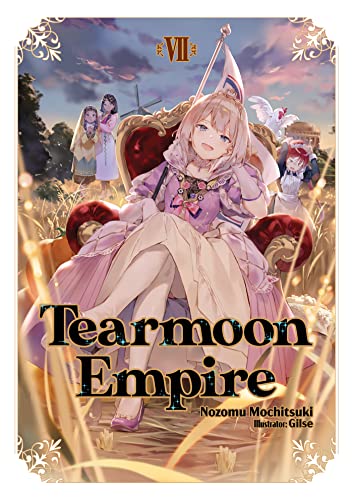By Nozomu Mochitsuki and Gilse. Released in Japan as “Tearmoon Teikoku Monogatari” by TO Books. Released in North America digitally by J-Novel Club. Translated by David Teng.
The narrative voice is one of the most well-known parts of this series, but we do occasionally see inside Mia’s own thoughts as well, and when we do we can sort of get what the narrator is talking about. There are several points in this book where Mia is essentially being a petty, selfish and gluttonous princess – we see how she thinks. In those cases, yes, the fact that everyone misinterprets her can be ridiculous. That said, we also see many times in this volume Mia’s sharp instincts to avoid the guillotine, and those are top-tier. When Mia doesn’t think but simply reacts, be it to a death flag or when she sees one of her friends is unhappy, she shines. And heck, even her selfish pettiness doesn’t last long – her desire to see a money-grubbing merchant suffer is thrown out the window when she sees him legitimately suffering the aftereffects of a heart attack. In this book we really do see that if she does become Empress, she might just do OK.
The first fifth of the book wraps up the third “arc” we’ve been reading, with Mia returning home for the weeklong festival to celebrate her birthday, as we are reminded that her father is, not to put too fine a point on it, a freak. That said, it’s the colors Mia wears to her party that make the impression. After this we move into a new arc which features Mia, having set up an excellent program to combat famine, trying hard to keep it from collapsing. Chaos Serpents are still trying to sow discord, but we also have to deal with those who realize that a famine can be a great way to make a pile of cash if you’re the one delivering the food. Now Mia and Ludwig have to face off against an antagonist who Mia remembers from her past life… when things ended in disaster. Can she turn things around with the help of a commoner studying medicine and the power of wheat?
This is usually the point of every review where I get annoyed at the narrator for harping on Mia being chubby, and yeah, it’s here as well. That said, we also see Mia chiding herself for a different kind of flab. A couple of times in this book she makes the mistake of being complacent, and that’s when disaster pricks at her intuition. Given that there is a secret society whose goal is to destroy her and her kingdom, Mia simply can’t stop and just relax. I think, in time, this will become second nature to her – she just needs to have her thoughts map to her instincts more. She also has help. Ludwig is hilarious here, taking on the brunt of “misunderstand Mia in a positive way” and realizing that if you truly want to change everything about the Empire, might as well also let people like him be Chancellor. As for Shalloak, the “evil” merchant, his story actually ends up being heartwarming and tragic at the same time – the benefits of people dreaming of their past lives in another world.
Add to this one of the best side stories in the entire series, where a search for cake will make you cry, and you have a fantastic volume. Each one of these is a treasure.


